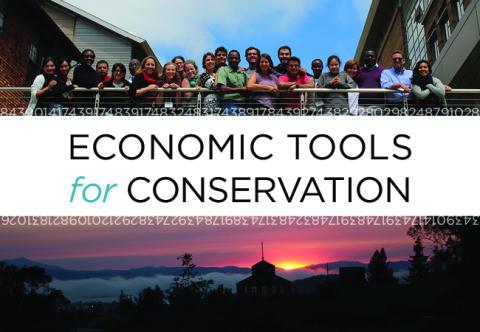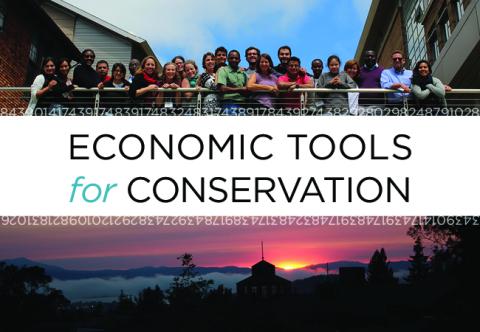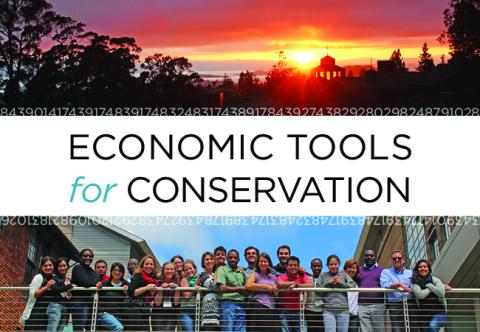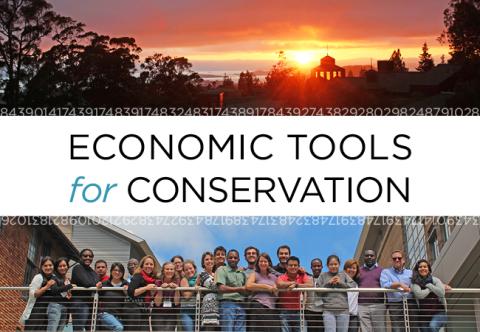
USA
Our 19th annual International Economic Tools for Conservation course held at the University of California Berkeley where we hosted 33 conservation professionals working in 20 different countries for organizations including Conservation International, USAID, World Wildlife Fund, The Nature Conservancy, UN Environment, the US National Park Service and the Waitt Foundation.
“This course provided an important framework for bringing economic analysis into my work on environmental issues in Colombia. At the end of the day, it is on these economic terms that most, if not all, policy decisions are made. But the best part of the course was the great group of international professionals that bring their real world, country specific experience into the course. I highly recommend this course to anyone working on environmental and/or development issues internationally.”
-Todd Hamner, USAID, Colombia
Conservation Strategy Fund is offering its annual international training course, Economic Tools for Conservation, June 19-30, 2017 at the University of California Berkeley. CSF’s Economic Tools courses are regarded as the premier training event in applied economics for environmental professionals. We are proud to partner with the University of California Berkeley, widely recognized as the top public university in the world and a leader in applying environmental science and policy to conservation and development challenges. Our program will be hosted by the International and Executive Programs at UC Berkeley.
During the comprehensive two-week session, participants learn to use economics to be more strategic and successful in their work, and experience a transformational shift in how they view environmental issues. The course covers economic fundamentals, natural resource economics, valuation of ecosystem services, environmental policies, communication and negotiation techniques, and hands-on experience with cost-benefit analysis of projects and policies. These skills are crucial at a time when global-scale environmental changes are being driven by a diversity of economic factors, and when conservation leaders are striving to harness opportunities to reward the preservation of ecosystem services.
“The experience from this course is immeasurable and definitely leaves me in a better position to make a significant contribution to environmental management in Uganda and the world at large. The knowledge and skills imparted by CSF have really transformed my thinking about environmental economics and how it relates to development programs. I, now more than ever, believe that it's time for environmentalists to work closely with other professionals and economists to create the impact that we all desire - a clean and healthy environment.” – Carol Kagaba Kairumba, Uganda, 2016 Course Graduate
PARTICIPANTS
This course is for people at the forefront of conservation challenges, including managers of conservation programs and protected areas, directors of non-governmental organizations, and representatives of government agencies. Applicants from a variety of disciplines such as biology, forestry, law, anthropology, or economics are encouraged to apply. Previous training in economics is beneficial, but not essential. Applicants must be proficient in spoken and written English.
Year after year, participants give CSF’s Economic Tools for Conservation course highest marks in terms of content, instructors, staff and the overall course experience. Our courses also create significant and lasting impacts. Alumni report that:
The course influenced how I approach my conservation work – 95%
The training was one of the most useful short courses I have attended – 92%
I continue to benefit from my CSF training – 90%
"I not only learned about economic concepts that will help me in my career, facing environmental issues, but also this course gave me the opportunity to meet wonderful people from around the world. These people have inspired me to believe and to have hope for the challenges we are facing. I feel very happy and lucky to have been a part of the course and part of this wonderful group." – Isabel Felandro Llanos, Peru, 2015 Course Graduate
BENEFITS
Participants gain:
- An essential foundation in basic economic concepts and language.
- Insight into the drivers of environmental problems, including market and institutional failures.
- Skills to evaluate the costs and benefits of natural resource management and development decisions, including values of ecosystem services.
- The ability to formulate more effective strategies and policies for conservation.
- Invaluable practice using communication and negotiation techniques to articulate environmental values in a language that communities, businesses, and governments can understand.
- A close network with fellow conservation professionals through the unique CSF Residence Program on the Berkeley campus.
“I gained a basic understanding and newfound appreciation of economics and how applicable it is in everyday life. I now understand the value and the role of economics in mitigating environmental degradation.” – Jaclyn Eng, Singapore, 2016 Course Graduate
COST
The total cost for the two-week program is $5000 per participant. This fee covers the following:
- Instruction by economic experts
- CSF course facilitators and residential staff
- All course materials and supplies
- Exclusive access to CSF online workspace with course reading and materials
- 13 nights lodging in residential housing on the UC Berkeley campus
- All meals and coffee breaks during course
- Field trip
- Travel health insurance, if not provided by employer
- Lifetime membership in CSF’s global Alumni Network
Accepted applicants are responsible for seeking their own funding from employers, government, sponsors or other funding sources to cover their course fees and travel expenses.
Please review our training program payment policies.
“The course is definitely the most cost effective way of making environmentalists literate in economics.” – Mohamed Bakarr, USA/Sierra Leone, 2016 Course Graduate
For information about grant opportunities, click here.
PROGRAM
Click here to see the 2016 course schedule.
Microeconomics
- Market theory: Supply, demand, market equilibrium, and competition.
- Externalities, market failures and public goods: Why markets are inefficient when it comes to environmental protection.
Natural Resource Economics
- Capital theory: The time value of money, interest rates and how they influence the use of natural resources.
- Market and institutional failures related to open access, public goods and property rights
- Forestry and fishery economics, optimal harvesting and policy options.
- Economic solutions to natural resource management challenges including taxes, incentives, and establishing property rights (private or communal) for open access resources.
- Exercises and instruction focused on game theory and forest policy negotiation skills.
Environmental Policy
- An overview of various environmental policies to correct the problems of externalities, public goods and market failures.
- An overview of the role of environmental policies such as command and control legislation versus economic instruments for conservation such as taxes, subsidies, and tradable permit systems.
Environmental Valuation and Ecosystem Services
- Overview of links between ecosystems services and human benefits
- Environmental values, the methods used to calculate them, and how these methods are best used in various countries.
- Exercises to identify relevant ecosystem services and appropriate valuation methods.
Cost-Benefit Analysis
- Case studies evaluating the economic feasibility of small-scale and large-scale projects, including incorporation of externalities and sensitivity analysis.
- Effective strategies for presenting economic analysis results.
“The things I've learned here have given me a more panoramic view of the possible solutions and strategies to use in dealing with social-environmental conflicts.” – Liliana Navarrete, Peru, 2016 Course Graduate
INSTRUCTORS
Experts in environmental economics with extensive field experience and an understanding of real-world conservation challenges join CSF each year to teach Economic Tools for Conservation. Our instructors are drawn from CSF staff as well as leading academic and international institutions such as University of Wisconsin-Madison, University of Hawai’i, University of Brasilia, the World Bank and our partner, UC Berkeley. Links to individual instructor profiles are provided at the bottom of this page.
"The course enabled me to catch up on a decade of 'economics in conservation' within a span of just two weeks! And the excellent and passionate teaching style of all the instructors made it quite fun for a biologist like me.” – Mohamed Bakarr, USA/Sierra Leone, 2016 Course Graduate
LOCATION
The course is held on the University of California’s flagship campus in the heart of Berkeley, California. Situated in the East Bay Area near San Francisco and Silicon Valley, the beautiful 1,232-acre campus includes world-renowned research facilities, a large ecological reserve, and botanical gardens.
Participants enjoy a “back to university” experience in the residential facilities on the UC Berkeley campus. CSF staff will facilitate evening programs in our own lounge area to work on course exercises and case studies, and help participants give presentations about their work and home countries. The residence hall is walking distance to classes, dining facilities, and campus attractions.
ADDITIONAL INFORMATION
Participants should also budget for the following expenses:
- International and regional travel to and from UC Berkeley.
- U.S. visa fees - usually around $140. Please apply for a B1 business visa, as our short training course is considered as a professional conference or workshop.
- Airport transportation to and from Berkeley - about $35 each way from either the San Francisco or San Jose airport.
- Accommodation before and after the course.
- Transportation and lunch during day off - approximately $50.
- Other incidentals - $100.
“It's really incredible that a two week course can improve my ability to understand and use economic tools to achieve conservation goals. With a really straight forward and pragmatic analysis, it is possible to ask the right questions and understand who are going to be the winners and losers in environmental decisions and, most importantly, at what cost!” – Daniel Venturi, Brazil, 2016 Course Graduate
Apply today!
Another Training Opportunity from our Partners at IEP
If you are interested in the CSF Economic Tools course, you might also want to check out the Beahrs Environmental Leadership Program (ELP), organized by IEP at UC Berkeley. For the last 16 years, Beahrs ELP has provided state-of-the-art training in environmental and natural resource science, policy, and leadership to strengthen the capacities of environmental practitioners worldwide. Patricipants will benefit from the opportunity to interact with Berkelely faculty as well as their global peers to access new information and tools, share practical experiences, and develop collaborative leadership skills. Please visit the program website for more information.
UCB International & Executive Programs
IEP is a part of UC Berkeley’s College of Natural Resources, and was founded to provide leaders the tools necessary to address environmental and natural resource challenges. IEP has specialized programs designed for professionals to stimulate discussion on topics related to the work of the College of Natural Resources.



